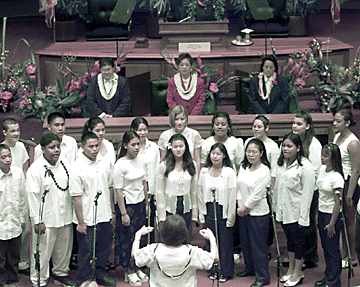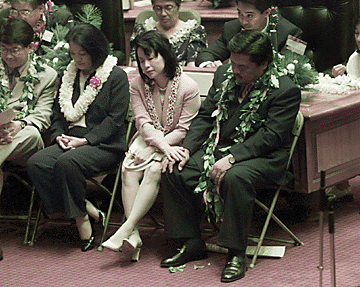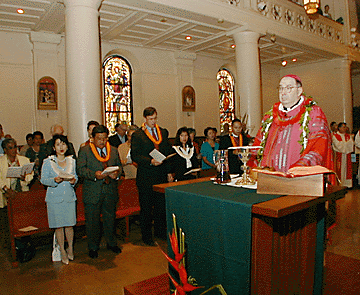

Legislators
hope to lower
tax load
Hawaii business leaders
Capitol Calendar
and the GOP praise the ideas that
Democrats in the House and
Senate have outlinedBy Mike Yuen
Star-BulletinRepublicans and business executives are praising proposals by Democratic legislative leaders who acknowledge that their No. 1 priority in the 1999 session is revitalizing the state's anemic economy.
Sen. Sam Slom (R, Kalama Valley) hailed Senate President Norman Mizuguchi's proposal to provide as much as $50 million in tax relief for small businesses.

And David Carey, president and chief executive officer of Outrigger Enterprises Inc., one of the state's leading hotel chains, saluted House Speaker Calvin Say's initiative for a dollar-for-dollar tax credit for hotel room renovation projects with a price tag of $1 million or more.Their responses came as the economic proposals were unveiled in speeches during the opening of the session yesterday.
Meanwhile, Gov. Ben Cayetano said he doesn't see any significant differences in what he wants to do and what lawmakers intend to do to boost the economy.
"We're pretty much on the same page," Cayetano said. "The question is, how do we go about it and get it done."
Cayetano will be unveiling his initiatives during his State of the State speech on Monday. They include civil service reforms and reducing the highest bracket of the personal income tax, now at 8.75 percent, to 7.25 percent in 2002 with corresponding decreases in other brackets.
"I heard some useful ideas (during the Legislature's opening day), but I think there has to be a recognition, first of all, of the impact of government on business," he said.
"I heard general remarks about reducing the bureaucracy, but I didn't really hear anything out of the box. I think you're going to hear it Monday."
Slom, one of the most caustic critics of the state's Democratic leadership, was effusive in his praise of Mizuguchi's proposal, which the Aiea Democrat said was still being fine tuned.
"Did I write that speech?" Slom, a longtime small business advocate, asked rhetorically. "It sounded so familiar, small business -- the bulwark, the foundation of the community. Help small businesses here first instead of outside. These are things Republicans have been saying for years."
He added: "But now that all the good words have been said, let's implement them. If everybody is serious, we could have a package in the first two weeks of this legislative session."

Linda Lingle, the former Maui mayor who came close to unseating Cayetano last year, heard the opening-day speeches while seated on the Senate and House floors next to GOP leaders."As in most years, the rhetoric is always appealing," Lingle said. "The public would like to see action. I think the fact that they are all focused on the economy is very important. They recognize that it's small business that needs to be addressed."
Lingle said she would also like lawmakers to eliminate the "pyramiding" of the 4 percent general excise tax, which imposes the tax at every stage of production or service, making the surcharge the equivalent of a 12 percent sales tax.
Eliminating the pyramiding is the key to reducing the state's high cost of living, Lingle said.
The Outrigger's Carey said Say's initiative is the sort of incentive that can provide a major boost for a key element of the tourism industry, the state's economic engine.
It would go beyond an earlier hotel-renovation initiative pushed by Cayetano, which the Legislature approved nearly two years ago, Carey said.
Cayetano's initiative granted for two years a 4 percent tax credit that could not be more than 10 percent of the hotel room tax that a hotelier paid the previous year.
"It was a good idea, but hard to take advantage of," Carey said. "There was a limited and a short time frame. We were able to get a couple of projects in. But it wasn't the kind of thing that you said,'Hah! This is something that's really special. This would move a couple of projects over the line.' The kind of idea that Speaker Say is talking about is that kind of incentive."
The sort of hotel room renovation tax credit that the Palolo Democrat envisions would be applied to all state taxes due over a 10-year period.
Cayetano said Say's proposal "sounds very, very expensive."

Red Mass audience hears
By Pat Omandam
plea against euthanasia
Star-BulletinA small minority in the local medical community is pushing the issue of physician-assisted suicide and physician-assisted death even though a recent local poll in the profession shows that most do support it, says Dr. S.Y. Tan, director of medical and medico-legal education at St. Francis Hospital.
Tan, speaking to lawmakers this morning at the annual Red Mass at The Cathedral of Our Lady of Peace, said this group's reason for supporting the end-of-life measures involves part-truths that are misleading.
"They base their case on mercy and free choice," Tan said.
Both issues are likely to be discussed by this year's legislature. A panel on Living and Dying last October recommended that Gov. Ben Cayetano introduce legislation to legalize physician-assisted suicide and physician-assisted death, or euthanasia.
Cayetano has said he would.
Tan said "mercy killings" are not necessary because patients already have a choice by stating their wishes in a living will. And those who suffer also have options.
Tan said a poll of 1,000 local doctors shows 80 percent are willing to give patients enough medication to ease pain so mercy killing is not needed.
And 90 percent of these doctors are willing to withdraw any treatment if patients request it in their living wills, he said.
Alternatives to improved end-of-life care other than physician-assisted suicide and euthanasia include hospices, which thousands in people in Hawaii already utilize, he said.
Besides, Tan said, suffering is part of the human condition.
Earlier in the Red Mass, the Most Rev. Francis X. DiLorenzo told politicians and worshipers, including Cayetano, Mayor Jeremy Harris and a dozen state lawmakers, that the Catholic Church needs their help to address some issues facing the state.
The Hawaii Catholic Conference opposes euthanasia.
"As a church, we can do only some of the things on behalf of what people want and expect from us," DiLorenzo said.
He said lawmakers have an "extraordinary burden" in carrying on with the peoples' plea for help.
"It isn't easy, what you're trying to do," said DiLorenzo.
Tan's talk was given at the end of the Red Mass, a tradition in Hawaii since 1955, celebrated each January during the start of the legislative session.
During the Mass, the Catholic Church prays for wisdom and guidance for state lawmakers.
The Mass was named for the color of the vestments generally used for a Mass of the Holy Spirit.
Senate chief proposes
By Pat Omandam
early childhood
education center
Star-BulletinSenate President Norman Mizuguchi has unveiled his vision for pilot projects in early childhood development and education.
During opening-day remarks yesterday, Mizuguchi (D, Aiea) proposed that the state Department of Education convert Linapuni School in Kalihi -- an abbreviated elementary school serving up to the second grade -- into an early childhood development and education center for all infants and children up to age 4.
It is an idea that Dennis Arakaki (D, Kalihi Valley), chairman of the House Human Services Committee and a member of the child-advocacy group Keiki Caucus, says has merit.
"In one sense it would be good to intergrate the kids into the (nearby) schools," he said. "And I think it may be more beneficial like that for the whole community, instead of just the immediate Kuhio Park Terrace (children)."
"I've heard before they were thinking of closing it, but to do this would be a positive move," Arakaki said.
Gov. Ben Cayetano, who was heavily involved in the development of Hawaii's A+ after-school program, praised the idea.
"I think the idea of two pilot projects to develop a history and get information is an excellent one," Cayetano said.
Mizuguchi also proposed an early childhood education center on the Waianae Coast for native Hawaiian infants and children under age 4, perhaps funded in part by Kamehameha Schools/Bishop Estate with some medical care from student practitioners at the John A. Burns School of Medicine.
And he suggested that the University of Hawaii infuse its Board of Regents with "additional vitality" by adding three nonresident regents with renowned national and international reputations, which gained the initial support of UH President Kenneth P. Mortimer.
Mortimer said yesterday that adding three prominent nonresident regents would give UH better visibility in mainland cities. David Morihara (D, Makawao), chairman of the House Higher Education Committee, and Vice Chairman K. Mark Takai (D, Pearl City) said they are open to the proposal.
"It would give us a more international and national flavor," Mortimer said.
"If you're trying to recruit students who come from California, it would be nice to have a regent or two from Los Angeles."
UH union against losing
By Craig Gima
right to strike
Star-BulletinThe executive director of the University of Hawaii's faculty union, J.N. Musto, wasn't expecting a surprise from his opening-day host, Senate President Norman Mizuguchi.
But that's what he got when Mizuguchi suggested yesterday that university faculty, public schoolteachers and state and county blue-collar workers give up the right to strike in favor of binding arbitration.
Musto said Mizuguchi never mentioned the proposal to him before the speech, and he does not like the idea.
"There's no way to bind the government, so therefore it's binding on only one party: us," Musto said. "How's that in our interest?"
The teachers union also opposes it, as does Gov. Ben Cayetano.
But former Republican gubernatorial candidate Linda Lingle likes the proposal. "It makes good sense in a state that is dependent on tourism to do anything you can to stop any disruption of public services," she said.
Cayetano believes the state would lose the ability to control costs if all labor disputes went to binding arbitration.
"I'm not a supporter of binding arbitration anymore," Cayetano said. "The state has suffered badly in those proceedings."
Police and firefighters are prohibited from striking, as are white-collar government workers.
Russell Okata, executive director of the Hawaii Government Employees Association, said he believes binding arbitration is working for his union members. "I think final and binding arbitration provides a very reasonable way of resolving impasses," he said.
But Karen Ginoza, president of the Hawaii State Teachers Association, said there is already a process in place whereby if both government and unions agree, they can turn to binding arbitration. "Both parties have to commit to binding arbitration and uphold it," she said.
Ginoza also noted that while HGEA has gone to binding arbitration to resolve collective bargaining impasses with the state, the union has yet to see the agreement funded.
Caucus wants money
By Terrence Lee
from tobacco settlement
for prevention program
Star-BulletinThe state Legislature's bipartisan Keiki Caucus wants to use money from a settlement with the tobacco industry to help prevent youths from smoking, urge early education and assure good health for children and youth.
The caucus proposes establishment of a tobacco prevention and control program that follows the recommendation of U.S. Surgeon General David Satcher, who urged the state to use the settlement money to prevent tobacco use among youths.
Other proposals, some to be funded with the settlement, also stress prevention and early action in child care:
The caucus proposals echoed the theme from a year ago: Early education and preventive measures will save the state more money in the long run.Creation of a school parenting curriculum as a graduation requirement.
Appropriations for alcohol and substance abuse treatment for youths.
Mandatory use of seat belts for back-seat passengers, and raising the allowable age of passengers riding in the beds of pickups from 13 to 18.
Funding for therapeutic programs as alternatives to incarceration.
Programs for early identification of at-risk youths and support interventions.
That would be done by cutting down on future costs stemming from social and medical problems later in life, such as long-term substance abuse and incarceration, caucus members said.
"Early education and early intervention are more cost-effective," said Rep. Dennis Arakaki (D, Kalihi Valley).
Rep. Barbara Marumoto (R, Waialae Iki) said discussion of youth-oriented solutions remains important although questions about the feasibility of the caucus' proposals are valid given Hawaii's current economic woes.
"Ideas are launched; the future is in doubt; but at least they're out there," she said.
Attorney General Margery Bronster has said it is up to the Legislature to determine how to allocate the $1.13 billion settlement that the state is to receive from the the tobacco industry over the next 25 years.
Hawaii was one of 46 states that filed suits against the tobacco industry, citing claims for health costs to treat smokers, and agreed to the industry's package offer of $206 billion.